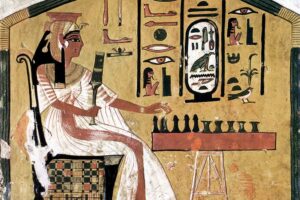Qin Shi Huangdi
259 – 210 BC ISK
The Chinese Ying Zheng was only 13 years old when he became the king of the state of Qin, which lies in the western part of China.
One of his main advisors was Li Sin who suggested that Ying Zheng adopt legalism , a system where strict laws were to apply to all citizens of the country.
When Ying turned 21, the army was placed under his command and he immediately set about conquering the seven kingdoms and uniting them into one empire.
It took him only a few years to reach that goal and in 221 BC. ISK had himself crowned as Shi Huangdi (meaning “first emperor”).
A warrior of bureaucrats ruled the empire of Shi Huangdi in China.
However, this was only the first step in unifying China. Over the next few years, he codified standards for government in each province, ensuring uniform units of measurement and weight along with writing symbols to promote trade.
The emperor had numerous canals dug, roads and efficient irrigation systems built, to increase the country’s harvest.
In addition, he built hellish fortifications in the northwest to stop the invading nomads. This was the beginning of the Great Wall of China.
Number of fatalities
For centuries, Chinese principalities had been at war with each other. At the beginning of the 3rd century BC the power of the Zhou Empire waned, ending with the disintegration of its territories.
Many states united and formed alliances with other states and then attacked other emirates.
Larger kingdoms subjugated smaller ones, and eventually seven kingdoms remained – Han, Wei, Chu, Qi, Yan and Qin.
“I propose that all history books be burned”.
Counselor Li Shi in conversation with Emperor Shi Huangdi in 213 BC.
Under the leadership of Shi Huangdi, the latter state was transformed from a despised frontier empire, whose inhabitants were considered pure barbarians, to a powerful military empire.
While Qin conquered one kingdom after another, there were many attempts to overthrow him – none of the attempts were successful.
Qin’s main rival, the state of Chu, had to submit to Shi Huangdi’s rule in 223 BC.
Thousands of clay soldiers were buried to follow their emperor.
What happened then?
Shi Huangdi determined that his descendants would rule China for all time. In order to rein in potential rivals, he ordered all previous kings and nobles to settle in the capital Xianyang, so he could observe their intrigues.
– 214 f. ISK
Shi Huangdi has the Lingqu Canal dug to join the Yangtse and Zhu Jiang rivers. By doing so, he wants to secure troop transports and prepare for further conquests in the south.
– 211 BC
An unknown person inscribes the following prophecy on a meteorite in Dongjun: “The first emperor will die and his kingdom will fall apart”. When no one does the deed, the emperor has all the citizens executed and the stone destroyed.
– 210 BC
Shi Huangdi dies and is buried in a tomb along with thousands of clay soldiers. A few years later, his empire fell apart.







